

derya samancı
The Power (and Peril) of Praising Your Kids. What do we make of a boy like Thomas?
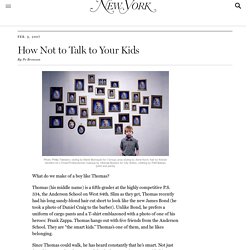
Thomas (his middle name) is a fifth-grader at the highly competitive P.S. 334, the Anderson School on West 84th. Slim as they get, Thomas recently had his long sandy-blond hair cut short to look like the new James Bond (he took a photo of Daniel Craig to the barber). Unlike Bond, he prefers a uniform of cargo pants and a T-shirt emblazoned with a photo of one of his heroes: Frank Zappa. Thomas hangs out with five friends from the Anderson School. They are “the smart kids.” Since Thomas could walk, he has heard constantly that he’s smart. But as Thomas has progressed through school, this self-awareness that he’s smart hasn’t always translated into fearless confidence when attacking his schoolwork. For instance, in the early grades, Thomas wasn’t very good at spelling, so he simply demurred from spelling out loud. Thomas is not alone. When parents praise their children’s intelligence, they believe they are providing the solution to this problem.
9 Things You Need to Know About Play (and Preventing Challenging Behavior!) ... Over and over again I’ve seen examples of intentional support for a child’s play result in language spurts, increased attention span, social skills, friendships formed, and dramatic reductions or the elimination of the challenging behavior…sometimes even when the behavior was occurring at other times of the day.
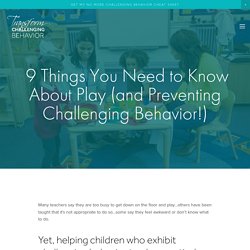
Curious? Read on… Deconstructing Role Play – Provide the Resources, Step Back and Watch Childre... Hospital, vet’s surgery, post office, travel agent – themed role play areas are often seen as a must for an early years setting. They are often meticulously prepared to be aesthetically pleasing, covered in laminated words and pictures with the aim of enticing children in. But this is where I encountered a problem: in these areas, children are expected to come together to play out adult scenarios that are consistent with these themes. Yet how many children have visited a travel agent to book a holiday recently, or operated on a pet dog in a vet’s surgery? For the majority of children, themed areas such as those described above are simply too alien for high-quality cooperative play to develop – which is why I found the children in my class would revert back to playing ‘mums and dads’ by mid-morning, rather than booking a holiday to Costa Rica, as the poster on the wall in the travel agent suggested!
I decided action had to be taken; it was time to improve my role play corner. The benefits. Symbolic play and language development. 1. Introduction 1.1. Choice page. The cognitive benefits of play: Effects on the learning brain. © 2008 - 2014, Gwen Dewar, Ph.D., all rights reserved Science supports many of our intuitions about the benefits of play. Playful behavior appears to have positive effects on the brain and on a child’s ability to learn.
In fact, play may function as an important, if not crucial, mode for learning. Want specifics? Here are some examples. Animal experiments: Play improves memory and stimulates the growth of the cerebral cortex In 1964, Marion Diamond and her colleagues published an exciting paper about brain growth in rats. When researchers examined the rats’ brains, they discovered that the “enriched” rats had thicker cerebral cortices than did the “impoverished” rats (Diamond et al 1964). Subsequent research confirmed the results—rats raised stimulating environments had bigger brains. Primary school shake-up to focus on ‘play-led’ learning. Children at primary schools would not study traditional subjects until as late as 10 years of age, under proposals being considered by policymakers.
Instead, there would be a much greater emphasis on creative play during the early years of primary school, and broader areas of learning in later years. Why Movement is Essential in Early Childhood. With so few years under their belts, my 3- and 6-year-old daughters are still learning to inhabit their bodies. They are learning how to maneuver themselves physically, how to orient themselves in space.
As Vanessa Durand, a pediatrician at St. Christopher’s Hospital for Children in Philadelphia, says, freedom of movement is necessary for children to meet their developmental milestones: “Children learn by experiencing their world using all of their senses. The restriction of movement, especially at a young age, impedes the experiential learning process.” Play to Learn. Why play-based learning? (free article) - Early Childhood Australia. Convention on the Rights of the Child. Arabic | Chinese | French | Russian | Spanish Text in PDF Format. Taking Playtime Seriously. So part of encouraging play is pulling back on how much programmed goal-directed learning we expect from very young children, to leave them time for the fun of exploration, curiosity and, well, fun.
But another important part may be creating environments that foster children’s play and parents’ participation and attention. Dr. Importance of play for babies & children. Australian Government Department of Education and Training (2009). Belonging, being and becoming: The early years learning framework for Australia. Canberra: Commonwealth of Australia. Retrieved 19 June 2019 from Cole-Hamilton, I. (2011). How young children learn English through play. As we release Learning Time with Timmy – our first app for early-years learners of English – Danitza Villarroel, a teacher on our Learning Time with Shaun and Timmy course in Chile, explains the importance of learning through play, and offers a few tips for teachers new to this age group.
Teaching English to pre-school children can be daunting for teachers new to this age group. Young children have shorter attention spans than older children and adults, and they're still learning their mother tongue. But teaching these learners can be enormously rewarding once you've taken a few basic principles on board. Play. 6 Types of Play: How Children's Play Becomes More Social. Play is a serious business. The pioneering developmental psychologist Lev Vygotsky thought that, in the preschool years, play is the leading source of development.
Through play children learn and practice many basic social skills. They develop a sense of self, learn to interact with other children, how to make friends, how to lie and how to role-play. Getting the right balance between adult-led and child-initiated learning. The Power of Evening Routines.
The word “structure” can evoke less than positive associations. It suggests constraints, which are never a good thing, right? Wrong. It turns out that everyone benefits from a certain amount of daily structure, so long as that structure is pleasant, productive, and meaningful. Whether it’s the most inventive minds in history, or those people who live in good health past 100, a daily routine or set of micro-routines is correlated with productivity, health, and longevity.
As beneficial as routines are for artists and centenarians, they are even more essential for children. Multilingual Preschoolers. It’s amazing how young children learn to converse with others. They have to not only internalize grammar and vocabulary, but also develop an understanding of culture: how to take turns in a conversation, who to talk to, and how to narrate a story.
A few more myths about speakers of multiple languages. Does being bilingual make you smarter? Language teacher and researcher Miguel Angel Muñoz explains the latest research on how being bilingual affects your brain, ahead of a British Council seminar in Cardiff on whether learning a foreign language makes you smarter. You can watch the live-streamed seminar on Tuesday, 3 June. More than half the world's population uses two or more languages every day It is hard to estimate the exact number of bilingual people in the world, as there is a lack of reliable statistics .
Public Media for Northern CA. How young children learn English as another language. By Opal Dunn, educational consultant and author Introduction.
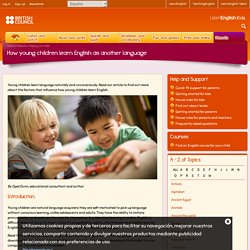
How can young children best learn languages? Lessonstream_relaunch_announce. Apps to help you improve your English. Teaching English with minimal resources. English vocabulary flashcards for kids. By Teachers, For Teachers... Flashcard Maker - Create & print flashcards in a flash! Pronunciation materials. BBC Learning English. Teens classroom rules posters - Smart white. Vocabulary activities.
The Pronunciation Blog - Adrian Underhill's Pronunciation Site. Phonemic chart. Kids and writing. In the classroom there are many ways of using these writing activities to help children practise their English whilst developing their creativity and imagination.
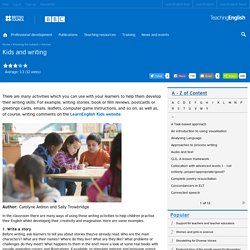
TeachingEnglish. Chunks. Personalised speaking. What our students bring to the learning environment is our richest resource.
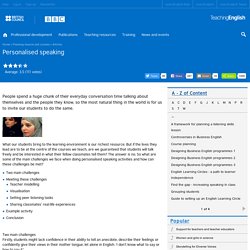
But if the lives they lead are to be at the centre of the courses we teach, are we guaranteed that students will talk freely and be interested in what their fellow classmates tell them? The answer is no. Ideas for using the coursebook creatively. Here is the second extract from the latest British Council publication 'Creativity in the English Language classroom' edited by Alan Maley and Nik Peachey.
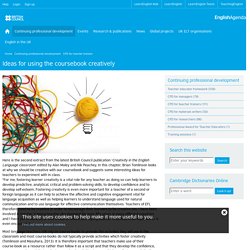
Fifteen ways to adapt your textbook so your students aren't bored to death. Unfortunately, teachers may only be given the textbook without any professional development or additional curriculum resources. It can be challenging, especially for newer teachers, to figure out how to use the textbook to meet the needs of culturally and linguistically diverse students who may be at different levels of English proficiency. Group work v. whole-class activities. Writing activities. Kids and writing. Product and process writing: A comparison.
Teaching speaking skills 1. Kids and speaking. Personalised speaking. TeachingEnglish. The magic of story time. Teens and reading skills. Course planning. Group work v. whole-class activities. Toolkit. AR2_2015. Cyberbullying guidance for schools - Childnet. Resources. Resources. Masterclass: Professional learning. Redefined. Teach English. Ice-breakers. Active listening activities. TeachingEnglish. Kids and speaking. TeachingEnglish.